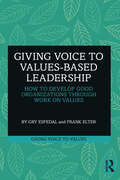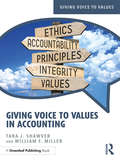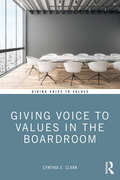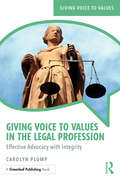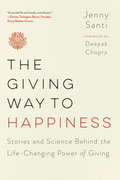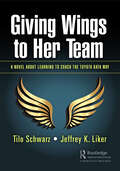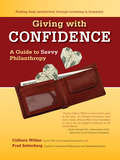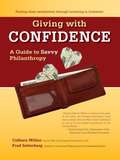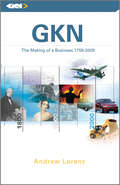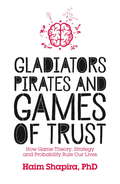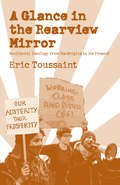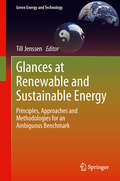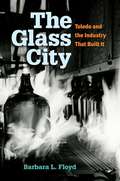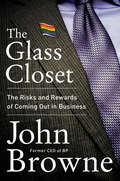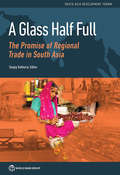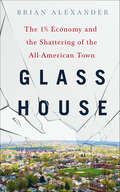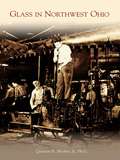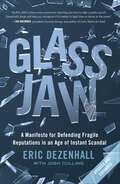- Table View
- List View
Giving Voice to Values-based Leadership: How to Develop Good Organizations Through Work on Values (Giving Voice to Values)
by Gry Espedal Frank ElterThe complexity facing today’s organizations calls for a rethinking of leadership. The world is facing grand challenges for people and the planet. Leaders and employees bear the responsibility of formulating strategies grounded in strong values. These strategies aim to foster the growth of sustainable organizations and promote ethical work practices. This book gives voice to values-based leadership and provides a method for leaders to develop a values-based organizational culture. Values play a role on many levels in how we work as individual leaders, in teams, and in organizations and in how organizations approach societal challenges. Values can be a compass or orientation point, giving direction for decisions and actions. Awareness of values can make organizational responsibilities clearer and give a sense of meaning to work and help leaders to create organizations where corporate, moral, and social values are embedded at every level. This book gives insight into a Scandinavian values-based leadership model built on the institutional leadership tradition. It provides processes and practices that leaders can use to develop organizations where values are continuously nurtured. The book provides practical ideas of how leaders can work on becoming conscious of both the organization’s explicit and implicit values, as well as working on the direction of the organization and its broader organizational culture. This book will be an invaluable resource for both practitioners and graduate students interested in leadership and organizational development.
Giving Voice to Values in Accounting (Giving Voice to Values)
by Tara J. Shawver William F. MillerThere has been much written on the importance of responsibility accounting and integrated reporting to ensure business accountability, but not on how to be a responsible accountant. As the accounting profession is built on the foundation of maintaining public trust, making the right decisions when faced with a challenging dilemma has a major impact on the long-term performance and perception of the firm as well as personal credibility. Accountants make judgement calls on a regular basis: they are privy to highly confidential information regarding their clients and their clients' businesses. Unethical earnings management practices can easily lead to falsifying records, but how does the accounting professional avoid succumbing to these practices when faced with other pressures? Giving Voice to Values in Accounting is the first book to explain the ethical dilemmas faced by accountants in their day-to-day work and to provide clear guidance for accounting students and professionals in navigating through these issues. The Giving Voice to Values (GVV) framework focuses on resolving ethical conflict by encouraging individuals to act on their values. This book provides accounting educators, coaches, trainers and professionals with both the impetus and the tools to easily implement the GVV offering into their own work, their organizations and in the classroom.
Giving Voice to Values in the Boardroom (Giving Voice to Values)
by Cynthia E. ClarkThis book takes the central issues facing board members today and applies the giving voice to values framework while also providing insights from practicing board members who have faced these issues. It covers such topics as strategic planning and monitoring, director independence, privacy and cyber risk, executive compensation and CEO succession planning. With this book, readers will also grapple with the conflicts of interest that might arise in the director selection process, role of the nominating committee and the compensation committee in order to cultivate more optimal board dynamics. The principles of giving voice to values start by asking a deceptively simple question: ‘What if you were going to act on your values—what would you say and do?’ The book then provides an overview of the current landscape of corporate governance along with the major rules and director duties applicable to the board of directors. The book’s latter chapters contain a series of five scenarios common to the board of directors that are presented as a set of “Board Challenges” involving the tensions often found in board work. In Giving Voice to Values in the Boardroom, the author, Cynthia E. Clark, provides practical strategies for board members and other constituents of corporate governance to deal with these challenges. These cases are designed to help users of the book implement prescripting and action planning. Each case will also have discussion questions about the stakes and stakeholders, common reasons and rationalizations and examples of how firms and governance professionals have handled similar board challenges.
Giving Voice to Values in the Legal Profession: Effective Advocacy with Integrity (Giving Voice to Values)
by Carolyn PlumpEthical issues do not occur in isolation. Instead, real-life situations arise in the workplace alongside other pressing issues such as job security, career advancement, peer pressure, manager evaluations, and company profits. For this reason, students and employees in law need concise and common sense guidance that provides a framework for how to voice one's values in the midst of competing interests. This book does just that. By providing twelve accessible scenarios drawn from real-life examples, this book walks readers through some of the most common ethical issues they will face in the workplace and how to address them in a manner that is realistic and effective. There are two clear reasons to read Giving Voice to Values in the Legal Profession. First, it is practical. The book presents information that is readily useful to students as they move forwards in their personal lives and careers. Second, the book is concise and easy to add to an existing course. It can provide a context for discussing a myriad of issues around ethics in the legal profession.
The Giving Way to Happiness: Stories and Science Behind the Life-Changing Power of Giving
by Deepak Chopra Jenny SantiWe often focus on how our gifts can help those in need. But the act of giving actually improves our own lives as well. <P><P>In The Giving Way to Happiness, Jenny Santi overturns conventional thinking about what it takes to be happy by revealing how giving to others--whether in the form of money, expertise, time, or love--has helped people from all walks of life find purpose and joy. Drawing on the wisdom of great thinkers past and present, as well as cutting-edge scientific research, Santi makes an eloquent and passionate case that oftentimes the answers to the problems that haunt us, and the key to the happiness that eludes us, lie in helping those around us. This book is filled with inspiring stories told firsthand by Academy Award winner Goldie Hawn, Noble Peace Prize winner Muhammad Yunus, supermodel Christy Turlington Burns, Teach for America founder Wendy Kopp, philanthropist Richard Rockefeller, environmentalist Philippe Cousteau, activist Ric O'Barry, bestselling author Isabel Allende, ALS survivor Augie Nieto, and many others from all over the world. Despite their diverse backgrounds, they have all found unexpected happiness and fulfillment through giving. This book tells us not just how they changed the world but also how their acts changed their very own lives. In addition, Santi reveals:- How altruism involves far more than suppressing basic selfish urges. Rather, we are wired to give, as it activates the same pleasure centers of the brain stimulated by food, sex, and drugs- How helping others--whether by walking a friend through a struggle that you've also experienced or by supporting a cause to honor a loved one's memory--can be a healthy way to deal with adversity and process grief - The unexpected reasons why those who "gave it all up" to make a difference, and who face the direst situations, are nevertheless some of the happiest, most fulfilled, and least angst-ridden people you'll ever meet.- Practical, universally applicable lessons on what kind of giving makes people happy and what doesn't. How do you discover giving that is unique to you and makes you feel good? In this inspiring book, Santi turns conventional wisdom upside down about what it takes to be happy and reveals the surprising reasons that have led so many people to live lives full of meaning, purpose and happinessFrom the Hardcover edition.
Giving Way to Passion: Letting Passion Be Your Guide and Practicing the Art of Possibility
by Rosamund Stone Zander Benjamin ZanderAll around us is vibrancy and energy. The universe is sparkling with generative power, but tapping into that vitality is sometimes difficult, especially when we find ourselves operating within the confines of competitive environments where survival is primary and resources are scarce. This is how we are conditioned to see the world, but life takes on shape and meaning when a person is able to transcend the barriers of personal survival and become a unique conduit for the vital energy within. In this chapter, the authors underscore the importance of giving way to passion in our personal and professional lives and provide examples that illustrate how being aware of where we are holding back, and choosing to participate wholly allows us to step into a universe of possibility. This chapter was originally published as Chapter 8 of "The Art of Possibility: Transforming Professional and Personal Life."
Giving Wings to Her Team: A Novel About Learning to Coach the Toyota Kata Way
by Tilo Schwarz Jeffrey K. LikerDenise dreamed of being the kind of leader who empowered and engaged her people, but was becoming frustrated and disillusioned. Denise -- a fast-rising, young consultant at a large advisory firm -- lands a job as a manager in industry. Crisis strikes as low-cost competitors take market share and general chaos generates late shipments. Denise goes into Lean consulting mode but quickly learns her supervisors are not buying it. They're not engaged, and they find the Lean tools confusing and a distraction from their goals of getting product out. It's going to take some magic -- magic that's available to you, the reader, too! Come with Denise on a journey of discovery and skill development, as she moves beyond the tools and concepts of Lean and focuses on daily practice that helps her supervisors achieve their goals. It's about an approach called Toyota Kata that helps anyone develop and apply scientific thinking -- an exploratory mindset of curiosity and experimentation. A mentor from an unlikely place appears and shares with Denise how to coach her team. Once her supervisors dig into real problems they face every day, they begin to engage. Step by step, with insightful inputs from her mentor, Denise starts developing the skills to become a coaching manager. She watches her team meet their current challenges and be ready for more. When you teach and practice scientific thinking and coaching skills you give wings to your team, and new worlds of opportunity open up. If you're a manager you'll identify with how the team in this story goes beyond general preaching about best practices, to practicing how to get to where they want to be. If you're a Lean practitioner frustrated with applying tools with a limited half life, you'll learn how to develop people so they can achieve their most important goals and keep going. And if you're already a Toyota Kata practitioner, well ... you will love this book!
Giving with Confidence: A Guide to Savvy Philanthropy
by Fred Setterberg Colburn WilburThere are thousands of books that tell you how to get money, but few that cover something just as challenging: how to give money away. Giving with Confidence provides thoughtful guidance culled from decades of experience in the philanthropy world. Whether you are an individual who donates to your favorite charity or the head of a small to medium-sized foundation, the gentle practicalities of this book will enable you to manage your giving with effectiveness and personal satisfaction. By following its seven core principles, you will have what you need for “improving the reach, scope, and impact” of your contributions.
Giving With Confidence: A Guide To Savvy Philanthropy
by Colburn S. Wilbur Fred SetterbergThere are thousands of books that tell you how to get money, but few that cover something just as challenging: how to give money away. Giving with Confidence provides thoughtful guidance culled from decades of experience in the philanthropy world. Whether you are an individual who donates to your favorite charity or the head of a large foundation, the gentle practicalities of this book will enable you to manage your giving with effectiveness and personal satisfaction. By following its seven core principles, you will have what you need for ''improving the reach, scope, and impact'' of your contributions.
Giving with Confidence: A Guide to Savvy Philanthropy
by Colburn Wilbur Fred Setterberg&“The pitfalls, potential, and the ins and outs of charitable giving . . . a must-read for all nonprofit leaders, donors, and students.&”—Marjorie Schwarzer, award-winning author of Riches, Rivals, and Radicals There are thousands of books that tell you how to get money, but few that cover something just as challenging: how to give money away. Giving with Confidence provides thoughtful guidance culled from decades of experience in the philanthropy world. Whether you are an individual who donates to your favorite charity or the head of a small to medium-sized foundation, the gentle practicalities of this book will enable you to manage your giving with effectiveness and personal satisfaction. By following its seven core principles, you will have what you need for &“improving the reach, scope, and impact&” of your contributions. &“Reveals the secret sauce of philanthropy with humor, wisdom, and plain good storytelling. This book is a gift for anyone who has considered giving.&”—Ralph Lewin, president and CEO of Cal Humanities &“There is a ton of advice for the wealthiest givers, but none for those of us who give more than $5,000 but less than $75,000 per year. Here in a non-dogmatic style are some approaches and guidelines to make donors feel more effective. Thank you, Cole and Fred.&”—Jan Masaoka, CEO of the California Association of Nonprofits &“[An] outstanding guide to creative and effective grantmaking, this time for the individual philanthropist.&”—Dawn Hawk, program officer for the Philanthropic Ventures Foundation &“Part up-to-date behind-the-scenes guide, part how-to, this potent little book distills the wisdom of a life&’s work in philanthropy by one of our best thinkers and most devoted practitioners.&”—Marilyn Bancel, author of Preparing Your Capital Campaign
GKN
by Andrew LorenzFrom the earliest days of the Industrial Revolution to the 21sts century motor and aerospace industries, this book is the story of how Britain's oldest major engineering company has remained at the heart of world manufacturing. The GKN Story is a chronological expos_ of the organization, from the origin of the group in 1759 in the Welsh Valleys to its global presence in 2009. The key milestones in the group's history will be described against the backdrop (and sometimes foreground) of contemporaneous political and economic events, from the Industrial Revolution and the Great War through the Great Depression and World War II to Britain's post-war decline, the rise of Europe and America, globalization and the shift in world economic power to BRIC and beyond. Key business themes will be drawn out from the experiences of the organization and these will pepper the text throughout as the story unfurls. Today GKN is concerned with the long term sustainability of its business and, as such, balances a number of objectives, each of which will be exposed within the text. Currently, the organization's mission is to deliver outstanding products and services to customers and superior returns to shareholders, and to drive benefit from the overall economic, social and environmental performance of GKN.
Gladiators, Pirates and Games of Trust: How Game Theory, Strategy and Probability Rule Our Lives
by Haim ShapiraA bestselling Israeli author offers a delightful take on decision making for non-experts and non-mathematicians. Written in simple language, the book is essential reading for business professionals and anyone interested in cognitive psychology and economics.Shapira provides humorous anecdotes and insightful examples of how our daily lives are affected by Game Theory. Game Theory is the mathematical formalization of interactive decision-making – it assumes that each player's goal is to maximize his/her benefit, whatever it may be. Players may be friends, foe, political parties, states, or anyone that behaves interactively, whether as a group or as an individual. One of the problems with game analysis is the fact that, as a player, it’s very hard to know what would benefit each of the other players, some of us are not even clear about our own goals or what indeed might actually benefit us. Haim Shapira uses multiple examples to explain what Game Theory is and how the different interactions between decision makers can play out. • Meet the Nobel Prize Laureate John F Nash and familiarize yourself with his celebrated equilibrium • Learn the basic ideas of the Art of Negotiation • Visit the gladiators’ ring and apply for a coaching position • Build an airport and divide inheritance • Issue ultimatums and learn to trust
A Glance in the Rear View Mirror
by Eric ToussaintAs the financial crisis continues to shake the economy it has begun to expose cracks in the ideology long used to justify neoliberal policies. This informed and accessible primer drives a wedge into these cracks, allowing the non-expert to understand the flaws in the economic philosophy of the 1%.
Glances at Renewable and Sustainable Energy: Principles, approaches and methodologies for an ambiguous benchmark
by Till JenssenDiffering interpretations, perspectives and expectations on the term sustainability exist. To take sustainability as an action guiding mandate for implementation it needs to be concrete and measurable as well it should weigh pros and cons. But how can such an integrated measurement in the field of renewable energy be conducted balancing the trade-offs between opposing indicators? Glances at Renewable and Sustainable Energy provides a thorough overview on the generic principles of sustainability assessment, including projective, thresholding and systemic principles and summarizes five common approaches for a holistic measurement. Approaches such as multi criteria decision analysis, ecological footprint analysis and normative-functional concepts are applied to different case studies in developed-, emerging and developing countries to cover a wide bandwidth of various renewable energy carriers under various conditions. Each case study includes 2 boxes illustrating the scheme behind the approach and exemplary calculations to allow a systematic comparison and a critical reflection of the methods applied. Compiling results on renewable energy assessment of the last decades, Glances at Renewable and Sustainable Energy gives researchers, students, consultants, politicians and entrepreneurs the tools to advance their oriental and instructional knowledge on sustainability and sustainability measurement, to reflect their decisions and tools for analysis and to transfer this knowledge into problem-solving.
Glaser on Health Care IT: Perspectives from the Decade that Defined Health Care Information Technology (HIMSS Book Series)
by John P. GlaserJohn Glaser has been an astute observer and recognized leader in the health care industry for over thirty years. He has written a regular column for Hospitals & Health Networks in which he comments on a wide range of topics, including improving organizational performance through health information technology (HIT), changes in HIT architecture, challenges in leveraging data, and the evolution of the role of IT leadership. Glaser on Health Care IT: Perspectives from the Decade that Defined Health Care Information Technology is a collection of some of the most widely read articles that have been published in H&HN Daily, H&HN Weekly, and Most Wired Online in the past decade (2005–2015). The columns are dated to show their original publication dates, and the material is organized into four broad themes: HIT Applications and Analytics Challenges Improving Organizational Performance through HIT IT Management Challenges HIT Industry Observations Each section offers readers an intimate look at the myriad issues associated with getting IT "right" and the organizational performance gains that can be achieved in doing so. Moreover, the book examines the power and potential of the technologies available to health care providers today, as well as the transformative nature of those we have yet to fully embrace.From seasoned CIOs and consultants to software developers and nurses, this book provides invaluable insights and guidance to all those seeking to make the delivery of care safer, more effective, and more efficient through the application of health care IT.Foreword by Russ Branzell, President and CEO, College of Healthcare Information Management Executives (CHIME) Co-published with Health Forum, Inc.
Glasnost: Democracy Comes to the Fed--The Fed Under Ben Bernanke
by Ethan S. HarrisIn this chapter, leading economist, Ethan Harris, explores how the internal workings of the Fed have changed under its new chairman, Ben Bernanke. He looks at how the passing of the mantle from a data junkie to a former academic has changed the economic and policy discussion within the Fed, and at the implications of having a less dominant chairman.
Glasnost in Action: Cultural Renaissance in Russia (Routledge Revivals Ser.)
by Alec NoveFirst published in 1991, Glasnost in Action: Cultural Renaissance in Russia is a comprehensive portrait of a society in transition as Professor Nove reflects on the changes taking place in the USSR at that time. While in English, Glasnost means ‘openness’, the author questions what ‘openness’ actually means in the USSR. How is Soviet culture – their art, literature, theatre, music and social life – affected by the new freedom of speech and thought that resulted from Glasnost? Was it Gorbachev’s power and charisma that propelled Glasnost or would it build up enough momentum in Soviet society to continue independently? Professor Nove uses examples from each area of Soviet life in his exploration of the new openness, referring to the release of previously banned films, writings, plays and works of art, while reflecting on the newfound honesty about the country’s Stalinist past and the problems faced today.
Glass Ceilings And Dirt Floors: Women, Work, And The Global Economy
by Christine Firer HinzeToday's market economy depends upon, yet undervalues, the essential contributions of households to the care work that makes all other work possible. As designated tenders of the care economy, women take daily, costly responsibility for a fundamental fact that mainstream economics underplays or conceals, market economy depends continuously on another economy, wherein our embodied vulnerabilities are respected and addressed by way of caring labor and relationships. In this compelling expose on the (in)justice of women's work, Christine Firer Hinze argues for re-prioritizing the holistic understanding of economy as oikonomia-literally, the management of a household in order to sustainably provide for all members-assumed in traditional classical, and contemporary political economics. This oikos-focused paradigm addresses global work-family struggles at their roots by shifting the axis of our economic imaginations, values, and policy making from a marketized-competitive model to one that prioritizes economy's inclusive, provisioning purposes. Following several years of working in inner-city ministry and teaching high school in Detroit, Christine Firer Hinze received a PhD in Christian social ethics from the University of Chicago Divinity School. Her research and teaching focus on Catholic social and economic ethics, women and work, and power and social transformation. Book jacket.
The Glass City: Toledo And The Industry That Built It
by Barbara Floyd Barbara L. FloydThe headline, “Where Glass is King,” emblazoned Toledo newspapers in early 1888, before factories in the Ohio city had even produced their first piece of glass. After years of struggling to find an industrial base, Toledo had attracted Edward Drummond Libbey and his struggling New England Glass Company to the shores of the Maumee River, and many felt Toledo’s potential as “The Future Great City of the World” would at last be realized. The move was successful—though not on the level some boosters envisioned—and since 1888, Toledo glass factories have employed thousands of workers who created the city’s middle class and developed technical innovations that impacted the glass industry worldwide. But as has occurred in other cities dominated by single industries—from Detroit to Pittsburgh to Youngstown—changes to the industry it built have had a devastating impact on Toledo. Today, 45 percent of all glass is manufactured in China. Well-researched yet accessible, this new book explores how the economic, cultural, and social development of the Glass City intertwined with its namesake industry and examines Toledo’s efforts to reinvent itself amidst the Midwest’s declining manufacturing sector.
The Glass Closet: Why Coming Out Is Good Business
by John Browne"I wish I had been brave enough to come out earlier during my tenure as the chief executive of BP. I regret it to this day. I know that if I had done so, I would have made more of an impact for other gay men and women. It is my hope that the stories in this book will give some of them the courage to make an impact of their own."--John Browne<P> Today gay men and women in the Western world enjoy greater acceptance and more legal protections than ever before. Yet an alarming number of businesspeople choose to remain closeted at work. In The Glass Closet, John Browne, the former chief executive of BP, argues that whether you're lesbian, gay, bisexual, transgender, or straight, it's better for you and your business when you bring your authentic self to work.<P> Browne draws on the latest research, his own experience as a closeted gay man in the oil industry, and interviews with gay and lesbian leaders to expose the lingering culture of homophobia in corporations around the world, and to inspire the LGBT community to share who they are with their employers and coworkers. Courageous and thought-provoking, this call to arms demonstrates that the hidden cost of hidden lives is far greater than we have previously thought.
Glass Egg Digital Media
by David B. GodesGlass Egg is an outsource games development firm in Vietnam. They are able to offer brand-name publishers -- Microsoft EA,Atari -- significant cost savings in the development of art assets for their video games. However, the firm's management find themselves at a point at which they feel they need to make a strategic decision that will enable Glass Egg to grow more substantially and more quickly. They are evaluating three possible directions including expanding the sales force, expanding the scope of art development services they offer and, more radically, going into the games publishing business themselves. Besides offering a picture of an interesting firm in a growing, dynamic country and business, the case allows for an exploration of two important general themes: 1.) Assessing alternative growth strategies. When should one pursue "more of the same" business vs. offering another product vs. looking for new customers? When is it better to develop an entirely different line of business with different customers and different products? (2) What are the differences between marketing to businesses vs. marketing to consumers? Since one of the options the firm is considering involves a consumer product -- online game development -- the case supports a discussion about the important differences, not only in terms of the nature of the buying process and buying center but also in terms of the vastly different organizational resources and structures that are needed in each.
A Glass Half Full: The Promise of Regional Trade in South Asia (South Asia Development Forum)
by Sanjay KathuriaTrade has played a critical role in global poverty reduction. In harnessing the potential of trade, some of the most successful countries have developed strong trade relationships with their neighbors. However, many South Asian countries have trade regimes that often offset the positive impact of geography and proximity. This report documents systematically the gaps between current and potential trade in South Asia and addresses important specific barriers that have held trade back. These barriers include tariffs and paratariffs, real and perceived nontariff barriers, connectivity costs, and the broader trust deficit. This policy-focused report unpacks these critical barriers to effective trade integration in South Asia through four in-depth studies that produce new, detailed, on-the-ground knowledge. Three of the studies are based on extensive stakeholder consultations. Two also rely on tailored surveys. The fourth study, on tariffs, benefits from new data on paratariffs. The report also marshals new evidence showing how trading regimes in South Asia discriminate against each other. Given the South Asian context, incremental, yet concrete steps aimed at tapping the potential of deeper integration are appropriate. The report has been drafted in this spirit. It offers precise, actionable policy recommendations that could help achieve measurable progress in key areas of trade and integration that would be to the advantage of all countries in the region.
Glass House: The 1% Economy and the Shattering of the All-American Town
by Brian AlexanderFor readers of Hillbilly Elegy and Strangers in Their Own LandWINNER OF THE OHIOANA BOOK AWARDS AND FINALIST FOR THE 87TH CALIFORNIA BOOK AWARDS |NAMED A BEST/MOST ANTICIPATED BOOK OF 2017 BY: New York Post • Newsweek • The Week • Bustle • Books by the Banks Book Festival • Bookauthority.comThe Wall Street Journal: "A devastating portrait...For anyone wondering why swing-state America voted against the establishment in 2016, Mr. Alexander supplies plenty of answers." Laura Miller, Slate: "This book hunts bigger game.Reads like an odd?and oddly satisfying?fusion of George Packer’s The Unwinding and one of Michael Lewis’ real-life financial thrillers."The New Yorker : "Does a remarkable job." Beth Macy, author of Factory Man: "This book should be required reading for people trying to understand Trumpism, inequality, and the sad state of a needlessly wrecked rural America. I wish I had written it." In 1947, Forbes magazine declared Lancaster, Ohio the epitome of the all-American town. Today it is damaged, discouraged, and fighting for its future. In Glass House, journalist Brian Alexander uses the story of one town to show how seeds sown 35 years ago have sprouted to give us Trumpism, inequality, and an eroding national cohesion.The Anchor Hocking Glass Company, once the world’s largest maker of glass tableware, was the base on which Lancaster’s society was built. As Glass House unfolds, bankruptcy looms. With access to the company and its leaders, and Lancaster’s citizens, Alexander shows how financial engineering took hold in the 1980s, accelerated in the 21st Century, and wrecked the company. We follow CEO Sam Solomon, an African-American leading the nearly all-white town’s biggest private employer, as he tries to rescue the company from the New York private equity firm that hired him. Meanwhile, Alexander goes behind the scenes, entwined with the lives of residents as they wrestle with heroin, politics, high-interest lenders, low wage jobs, technology, and the new demands of American life: people like Brian Gossett, the fourth generation to work at Anchor Hocking; Joe Piccolo, first-time director of the annual music festival who discovers the town relies on him, and it, for salvation; Jason Roach, who police believed may have been Lancaster’s biggest drug dealer; and Eric Brown, a local football hero-turned-cop who comes to realize that he can never arrest Lancaster’s real problems.
Glass in Northwest Ohio
by Quentin R. Skrabec Jr.The discovery of natural gas around Findlay in 1886 started an industrial rush in northwest Ohio. Within five years, over 100 glass companies had moved into the region for free gas and railroad connections to the western markets. Unfortunately the gas ran out in just a few years, and many glass companies moved on, but those that stayed changed the nature of the glass industry forever. A brilliant inventor, Michael Owens of Libbey Glass automated the glass-making process after 3,000 years of no change. His automated bottle-making machine changed American life with the introduction of the milk bottle, beer bottle, glass jar, baby bottle, and soda bottle. It also eliminated child labor in the glass factories. Owens also automated the production of fl at glass by 1920. By 1930, over 85 percent of the world's glass was being produced on the machines of Michael Owens, bestowing the title of "Glass Capital of the World" upon northwest Ohio.
Glass Jaw: A Manifesto For Defending Fragile Reputations In An Age Of Instant Scandal
by Eric DezenhallIn an age when scandal can destroy a company's brand or anyone's reputation in an instant-GLASS JAW is an Art of War guide to modern crisis management. In boxing terms, a tough-looking fighter who can't take a punch is said to have a "glass jaw," and so it is these days with targets of controversy. Down the rabbit hole of scandal, the weak are strong and the strong are weak. Just consider this slate of recent reputational body blows: Toyota, Susan G. Komen, Paula Deen, Tiger Woods, Joe Paterno, BP, the Duke Lacrosse players, Lance Armstrong, and Anthony Weiner. GLASS JAW is a manifesto for these times, written by crisis management veteran Eric Dezenhall, who has spent three decades dealing with some of the most intense controversies, both known and . . . handled with discretion. In the current digital age, the fundamental nature of controversy is viral, rendering once-mighty organizations and individuals powerless against scandal. In GLASS JAW, Dezenhall analyzes scandal and demystifies the paper tiger "spin" industry, offering lessons, corrective measures, and counterintuitive insights, such as: How there really is no "getting ahead" of a bad story (and other clichés from the media) The perils of navigating the "Fiasco Vortex" The art (and transaction) of the public apology Why a crisis is not an opportunity The Nixon Fallacy: if only he had just said "I screwed up," the whole thing would have gone away (not a chance) How you are the enemy: the self-sabotage of selfies, tweets, emailing before thinking, technology creep, the privacy vacuum, and the industrialization of leaking. From the boardroom to the parenting messaging board, scandals erupt every day. GLASS JAW explains this changing nature of controversy and offers readers counterpunches to best protect themselves.
